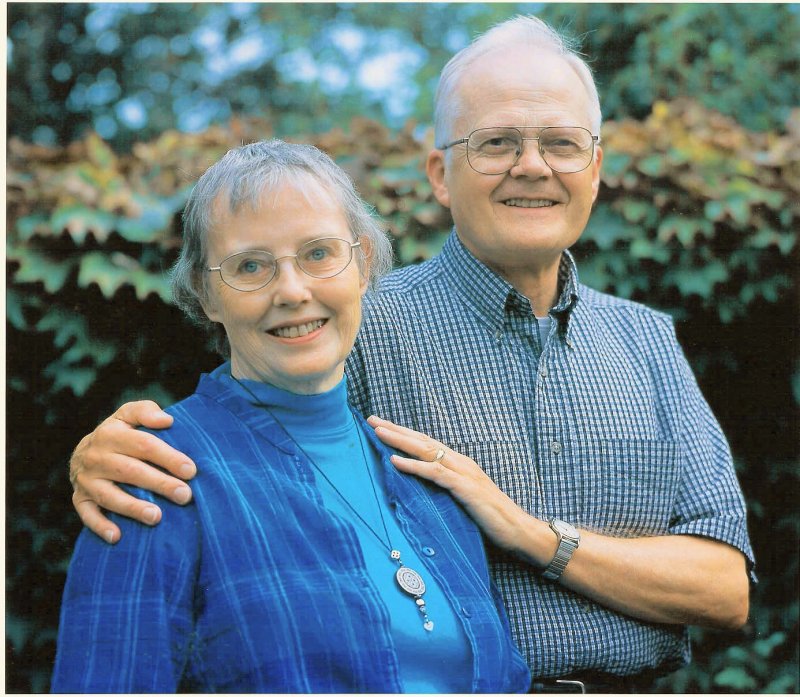I was raised in the small college town of Hiram, Ohio, where President James Garfield taught and was college president before being elected to the presidency of the U.S. That was before I was born. I attended school in Hiram, all twelve years in the same building, and was lucky enough to receive a scholarship to attend Case Institute of Technology (now part of Case Western Reserve University) where I had an idea that I might become an engineer. In my first semester I decided that I liked mathematics, and that began my path to Whitman. I began grad school at the U of California at Berkeley, where I worked on a Master's degree and met my wife Sally. In 1958, I received the MA, married Sally, and began teaching at Whitman. In those days college teachers were hard to find, and the PhD was not required. For the first two years, I taught five courses each semester, with many of the classes having over 30 students.
After four years, I returned to graduate school at Wisconsin, where I spent two years and got to the thesis stage. Then it was back to Whitman for three years, after which I spent a sabbatical year at LSU writing my thesis. I was there during Bob Fontenot's senior year, but didn't know him. He might not have come to Whitman if he had known me before he got here.
(What? Berkeley, then Wisconsin, and then LSU? One of my fellow grad students at Berkeley was a good friend of Sally's and mine. He finished his PhD and moved to Wisconsin, and suggested that I come there to continue my graduate work as his student. After I finished my course work and exams at Wisconsin, he moved to LSU, and arranged for me to work on my thesis with him there, but still receive my degree from Wisconsin. Sounds as if I were on the run from someone.)
Teaching at Whitman was great. I enjoyed the courses from Math 1 (I don't know what a comparable course is called now) all the way to Modern Algebra. In 1980, when I had a sabbatical, I decided to study some Computer Science courses in order to help expand our offerings in that area. In those days computer science graduates were hard to get in college teaching. I spent the year at WSU, taking a wide range of courses. I lived in Pullman during the week, and came back to Walla Walla on weekends.
As 1998 neared, I was feeling worn out, and decided to take an early retirement program. A year later, Sally and I visited Davis, California, and decided to move there. We had two daughters. One daughter, Judith, is a computer scientist who married a fellow from England. She now lives in Scotland, where she works in Edinburgh. The other daughter, Deborah, is a writer, now writing books for young readers. Many of her books are educational books in series aimed at elementary grades, but she also has a humorous picture book "Pirate Mom" that has a pretty large readership. Anyhow, Deborah lives in San Francisco. It is obvious that we could not get to live close to both daughters, and we found that Davis is close enough to get to see Deborah often, but not close enough to be accused of breathing down her neck. And it was a great comfort for Sally to be able to see Deborah often during her four-year fight with lymphoma, which ended in 2004.
We've had quite a number of our math students go on to college teaching careers themselves. One of the best of these tells me that I had him, and the rest of the Modern Algebra class, bamboozled in one class meeting. It happened that April 1 of that year fell on a day when the algebra class met. I managed to think of an amusement for them. I dreamed up a set of algebraic objects about which I could prove some theorems, all of the form "If A and B are woozles, then C". All these theorems were true and were correctly proved. It wasn't until fifteen minutes or so had elapsed that I mentioned to the class that, as we had indirectly proven some time earlier, the set of woozles is empty. Too bad the class had taken such careful notes!
What am I doing now? I sing with three choral groups: church choir, the Davis Chorale, and the UC Davis Chorus. These take up nine or ten hours a week. In 2006 I began taking a class in Taiko, a traditional Japanese drumming. After a year and a half, I moved from Beginner to Advanced Beginner, and in the summer of 2008 I was moved to Intermediate. Taiko is not an art to be learned quickly, especially for one with body and brain over 70 years old. In 2007 I began going to a Tai Chi group, just to expand my knowledge (or ineptitude) of oriental arts. And in 2006, in a moment of madness, I volunteered to edit the Davis Voter, the newsletter of the Davis League of Women Voters. All in all, I manage to keep busy enough that I don't have to worry about having nothing to do.
